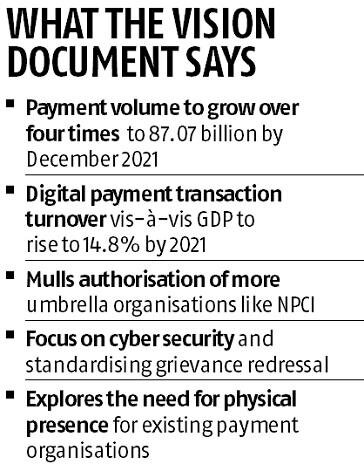Indian Economy
Payment and Settlement Systems in India: Vision 2019–2021
- 17 Jun 2019
- 5 min read
The Reserve Bank of India (RBI) has released its statement on ‘Payment and Settlement Systems in India: Vision 2019–2021’, which outlines the measures needed to be undertaken to foster innovation, cybersecurity, financial inclusion, customer protection, and competition.
- The Payment Systems Vision 2021 envisages achieving a ‘highly digital’ and ‘cash-lite’ society through the goalposts of competition, cost-effectiveness, convenience, and confidence.

- The need for a self-regulatory organisation: for the digital payment space, which can serve as a two-way communication channel between the players and the regulator. The organisation will also work towards establishing minimum benchmarks, standards, and help discipline rogue behaviour.
- Potential gains: The number of digital transactions is expected to increase more than four times, from 20.69 billion in December 2018 to 87.07 billion in December 2021.
- The digital payment transaction turnover vis-à-vis gross domestic product (at current market prices) is expected to further increase to 10.37 per cent in 2019, 12.29 per cent in 2020, and 14.80 per cent in 2021.
- The RBI expects accelerated growth in individual retail electronic payment systems, both in terms of the number of transactions and increased availability.
- Payment systems like Unified Payments Interface (Immediate Payment Service) are likely to register average annualised growth of over 100 per cent and National Electronic Funds Transfer at 40 per cent over the vision period.
- Measures to be taken:
- The RBI will take measures to increase the penetration of acceptance infrastructure in the country.
- The infrastructure will be upscaled to at least six times the present levels in the next three years’ time.
- In order to have a coordinated approach towards regulation, the RBI shall engage with the other sectoral regulators like Securities and Exchange Board of India, Insurance Regulatory and Development Authority, Telecom Regulatory Authority of India, etc to remove friction in regulation and ease system operator and customer comfort.
- It will also consider the implementation of e-mandates/standing instructions for retail payment systems, subject to customer protection and adequate safeguards like authenticating payment instrument registration, mandating transaction limits, segments, etc.
Cash-lite economy
- It is an economy whereby there is a reduction in the high usage/volume of cash in circulation, thereby encouraging the use of electronic payment channels and reducing the cost of cash production and transportation.
- A Cash-lite society is a Society where most of the purchases of goods or services are made by credit card or electronic funds transfer rather than with cash or cheques, it is an environment where the money is spent without being physically carried from one person to the other.
Unified Payments Interface (UPI)
- It is a system that powers multiple bank accounts into a single mobile application (of any participating bank), merging several banking features, seamless fund routing & merchant payments into one hood.
- It also caters to the “Peer to Peer” collect request which can be scheduled and paid as per requirement and convenience.
National Electronic Funds Transfer (NEFT)
- It is an electronic funds transfer system maintained by the Reserve Bank of India (RBI). it was started in November 2005, the setup was established and maintained by the Institute for Development and Research in Banking Technology.
- NEFT enables bank customers in India to transfer funds between any two NEFT-enabled bank accounts on a one-to-one basis. It is done via electronic messages.
- Unlike Real-time gross settlement, fund transfers through the NEFT system do not occur on a real-time basis. NEFT settles fund transfers in half-hourly batches with 23 settlements occurring between 8:00 AM and 7:00 PM on weekdays and the 1st, 3rd and 5th Saturday of the calendar month.
- Transfers initiated outside this time period are settled at the next available window. No settlements are made on the second and fourth Saturday of the month, or on Sundays, or on public holidays.






